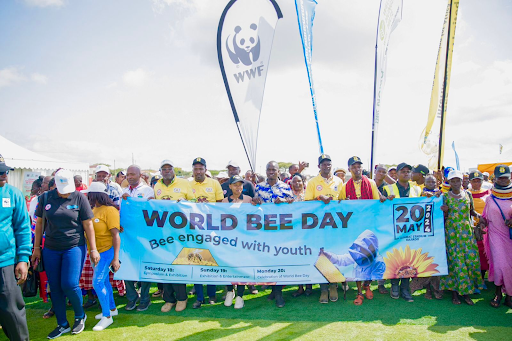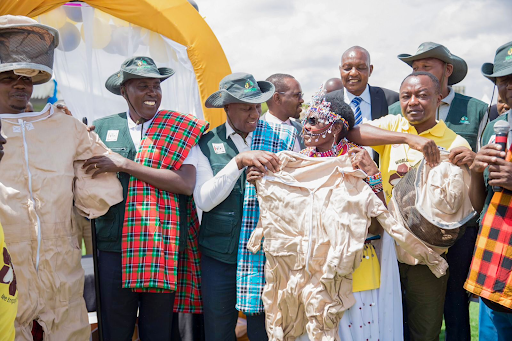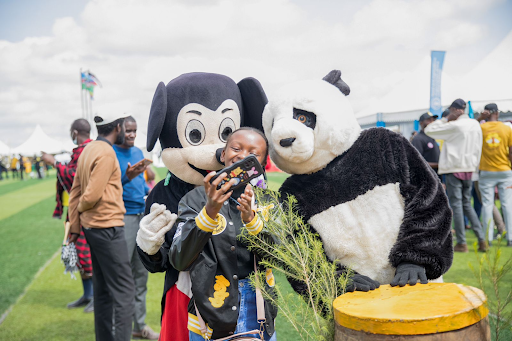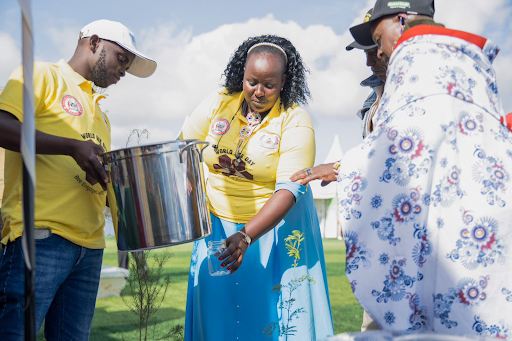
By Liz Anyango
Kajiado County, Kenya: The 6th edition of World Bee Day went down in pomp and colour in Kajiado County, Sourthern Kenya, demonstrating a renewed focus in protecting the threatened pollinators and empowering bee farmers.
Held at Ildamat Stadium, this year’s festivities showcased a vibrant blend of cultural performances and significant initiatives aimed at highlighting the vital role of bees as pollinators and sustainable development through beekeeping.
The commemoration began with a colorful march through Kajiado town, where students performed songs about beekeeping, and Maasai women, adorned in traditional attire, sang and danced joyfully.
The event which attracted hundreds of locals, beehive product aggregators, policymakers, financial institutions, researchers, farmers and conservationists was presided over by Livestock Development Principal Secretary Jonathan Mueke and Kajiado Governor Joseph Ole Lenku.

Principal Secretary of Agriculture Jonathan Mueke emphasized the critical link between bees, food security, and biodiversity conservation, quoting Albert Einstein’s famous words,
“If bees dissapeared, then people would only have four years of life left. No more bees, no more pollination, no more plants, no more animals, no more man” he said
Seventy-five percent of the world’s food crops depend on pollinators like bees, according to Hamisi Williams, Assistant FAO Representative Programmed in Kenya.
“The production of vital crops such as fruits, vegetables, nuts, and seeds heavily relies on bees, pollination is crucial in the agriculture sector and serves as a basic pillar for food production” he said.

Governor Joseph Ole Lenku speaking at the event said, “The county’s focus is to empower vulnerable groups, including women, youth, and people living with disabilities, amidst climate change challenges.
Lenku also launched the Kajiado Beekeeping Cooperative Society, aimed at uniting all beekeepers in Kajiado and strengthening the bee value chain. This initiative was developed in partnership with World Wide Fund for Nature- Kenya(WWF-Kenya).

Grace Larpei, a 26 year old beekeeper from Laikipia North, shared her inspiring success story, highlighting the profitability and minimal input required in beekeeping.
Grace has found financial stability and empowerment through beekeeping. As a young woman, she has not only broken cultural norms by providing for her family but also set a powerful example for other youth.
“Honey is bringing us more money than other livestock here,” she shared proudly. With 50 hives of her own and a partnership with a cooperative, Grace and her fellow beekeepers now manage an impressive 600 hives.
“I am in the business of honey and I am doing well. Bees only need water and trees, so the work involved is manageable. Our cooperative helps us also to sell the honey through digital marketing,” she added.
Dr. John Kioko, Programme Coordinator for the Amboseli-Chyulu Sublandscape at WWF-Kenya, highlighted the critical role bees play in both the environment and the economy.
“Beekeeping preserves woodlands, supports biodiversity, and addresses climate change issues,” he explained.
Dr. Kioko emphasized that the warm climate of Kajiado, with 90% of the area being suitable for beekeeping, makes it an ideal location for such initiatives. He further mentioned that initiatives by various stakeholders, including WWF-Kenya, have successfully organized communities into cooperatives like the Kajiado County Farmers Union for Beekeeping among others, which young Grace is part of
“Developing a county beekeeping strategy is our priority,” he added.

The event marked the culmination of a three-day celebration from 18th -20th May 2024, featuring exhibitions, symposiums, and educational activities. Organized by the Apiculture Platform of Kenya, the Food and Agriculture Organization Kenya Office, WWF Kenya and the County Government of Kajiado and the private sector, the event aimed to raise awareness and promote the vibrant beekeeping sector in Kenya.
Exhibitors showcased a range of bee products and innovative technologies, demonstrating the sector’s potential for economic growth and environmental conservation. World Bee Day serves as a reminder of the essential role bees play in maintaining ecosystems and food security globally. By raising awareness and empowering communities, Kenya is taking proactive steps towards preserving bees and their vital contributions to the planet.













